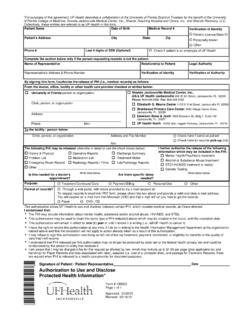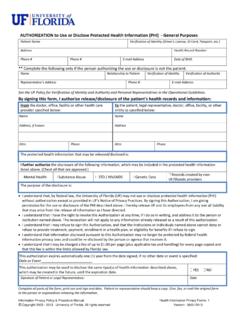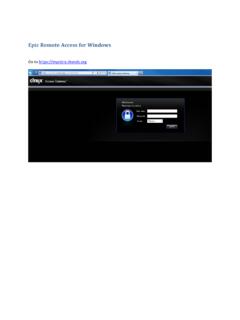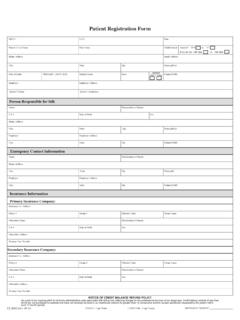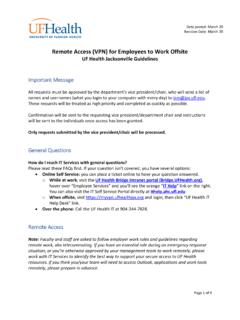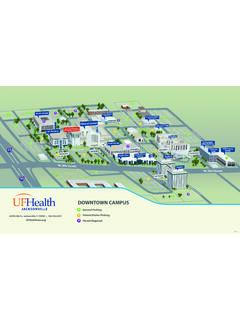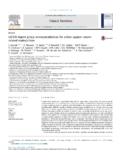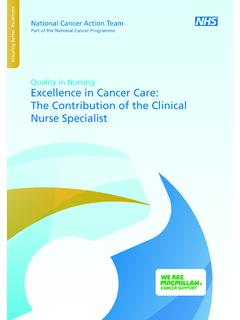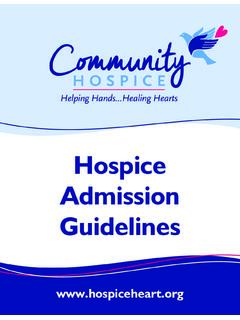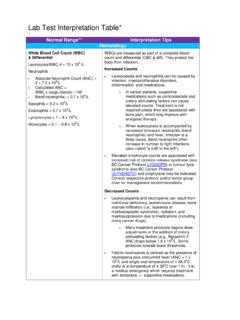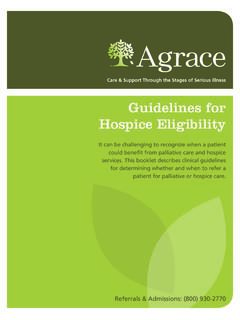Transcription of What are Age-Specific Competencies - UF Health Jacksonville
1 What are Age-Specific Competencies ? Skills which enable you to care for the patient, resident, or client at that individual's stage of life. " Age-Specific Competencies " means the ability to communicate with each patient, resident or client in a way that is appropriate to his or her particular age, capabilities or disabilities, temporary impairments, emotions, stresses, culture, and individual station. While we do not communicate with everybody in the same way, everybody receives the same respectful treatment. How Will This Help Me? Enable you to care for each person at every stage of life. Each patient/resident/client will get individual care , and can be a partner in his/her own care . Your work satisfaction will be improved as you improve patient care relationships and teamwork. Meets JCAHO standards! Age-Specific competency is required by the JCAHO for all employees and volunteers who provide direct patient care .
2 1 What are these Skills? Communication Safety & Security Health Recognition of Common Illnesses 2 Infants and Toddlers Approximate ages 0-3 years Are curious! Healthy Growth and Development: physical - rapid growth rate, especially the brain. mental - senses, explores, plays, communicates by crying, facial expressions, babbling, then baby talk and simple sentences. social/emotional - is trusting, dependent, beginning to develop a sense of self Communication: parents provide security and physical closeness, parent/child bonding; love and security are vital needs. Safety: needs safe environment for exploring, playing, and sleeping. Health : immunizations, proper nutrition, sleep, skin care , oral Health , routine screenings.
3 Examples of Age-Specific care for infants and toddlers: involve child and parent in care cuddle and hug child provide safe toys and opportunity for play encourage child to communicate - smile, talk softly, laugh help parents learn about proper care 3 Young Children Approximate ages 4-6 years Boy, are they active! Healthy Growth and Development: physical - grows at a slower rate, motor skills improve, dresses self, is toilet drained. mental - symbols become important, memory improves, and imagination is active. social/emotional - identifies with parent(s), is more independent, sensitive to others' feelings; note: safeguard against drowning associated with becoming independent at this age; exhibits fears; likes stories; may be aloof with strangers. Communication: parents and staff working with child, praise and give rewards, state rules as necessary, play with child; child loves to learn via games.
4 In hospital setting, staff may give toy stethoscope, and reassure child that procedures are not punishment. Safety: teach safety habits (bike/skate helmets, seat belts, swimming pools, and team sports) Health : continue immunizations, checkups, teach healthy nutritional habits and good personal hygiene, including the importance of hand washing. Illnesses: at this age the child's immune system is still immature. Subject to the onset of juvenile diabetes, colds, earaches, head lice, mumps, and ringworm 4 Examples of Age-Specific care for young children: involve parent(s) and child in care - let child make some choices, like food or juice choices; let child feel he or she is helping. use play techniques - toys, games, fun, etc., to teach child and to reduce fear. encourage child to ask questions, play with others if appropriate in the setting, and talk about feelings help parents teach child safety rules 5 Older Children Approximate ages 7-12 years the doers!
5 Healthy Growth and Development: physical - grows slowly until that spurt at puberty mental - active, eager learner, understands cause and effect, can read, write and do math social/emotional - focuses on school activities and "fitting in," while also developing a greater sense of self, negotiates for greater independence; needs to learn to cope with peer pressure Communication: encourage them, and give them the opportunity to feel competent and useful; build their self-esteem - ask them to help and praise them for helping; give them tasks they can do successfully (if they can't mow the whole yard, give them half the yard to mow for now); they need a measure of privacy Safety: continue to promote safety habits (school safety, etc.): encourage them to resolve conflicts peacefully instead of hitting; etc. Health : continue to keep up immunizations and checkups; continue to teach healthy nutritional habits, and good personal hygiene, including the importance of hand washing; provide information on smoking, drugs, alcohol, and sexuality.
6 Illnesses: mumps and measles are common for this age group. If they're not vaccinated, they can still get these diseases; also sore throats, head lice, ringworm, etc. 6 Examples of Age-Specific care for older children: allow the child to make some care decisions ("In which arm do you want the vaccination?) help build self-esteem - ask the child to help you do a task, and recognize his/her achievements guide child in making healthy, safe lifestyle choices (choosing apple juice over a carbonated beverage) if appropriate to the situation, help parents talk with child about peer pressure, sexuality, alcohol, tobacco, other drugs (make appropriate referrals to social workers in the case of management department) 7 Adolescents Approximate ages 13-20 years Transitional phase Healthy Growth and Development: physical - grows in spurts; matures physically; is able to reproduce mental - can think abstractly; goes beyond simple solutions, considers many options; able to make independent decisions; can consider consequences; chooses own values; is idealistic; thinks about the future social/emotional - develops own identity; builds close relationships.
7 Tries to balance desire to be part of peer group with family interests; is concerned about appearances; challenges authority. At this age, may also set career goals and choose lifestyle; likes to feel in control of self (in hospital setting will want to know what test they're going to do next, and what is involved); may need to learn to do dishes again ( after about age 12, they forget how) Communication: key concepts are their need for privacy, respect and acceptance, and the need to learn teamwork Safety: discourage risk-taking; promote safety habits (safe driving, violence prevention, the hazards of gangs, etc.) Health : continue regular checkups and update immunizations; promote sexual responsibility; advise against substance abuse Illnesses: viruses (sties in their eyes, etc.), acne, athlete's foot, mononucleosis, hepatitis 8 Examples of Age-Specific care for adolescents: treat more as adult than child; respect their opinions; avoid authoritarian approaches (don't order them around; they will probably rebel) show respect and patience - be considerate of how being in the hospital, or the procedures, etc.
8 , are affecting them (may be affecting their appearance); their friendships and their friends' opinions are very important to them provide guidance in making positively healthy choices in the hospital setting (set example for when they go home); correct misinformation encourage communication between doctor & adolescent, and if appropriate, between parent & adolescent encourage them to ask question regarding any fears they may have involve them in decision-making (even letting them choose their nurse - they'll cooperate better with someone they "click" with) 9 Young Adults Approximate ages 21-39 years Building Connections Healthy Growth and Development: physical - reaches physical and sexual maturity; nutritional needs are for maintenance not growth mental - acquires new skills and information, uses these to solve problems social/emotional - seeks closeness with others; sets career goals and chooses lifestyle (if hasn't already done so by now); chooses community and starts own family; this can be a stressful age: is the person meeting his/her goals?
9 Illness adds to stress - staff in hospital setting should be aware of this Communication: needs support and honesty, needs respect for personal values; Type A's need telephones and activity (they can die from inactivity); they need respect for their choices. Safety: provide information for hazards at home and work; information regarding back safety (avoiding injuries); hurricane/disaster preparedness Health : encourage regular checkups, update immunizations (tetanus, hepatitis, flu, pneumonia); promote healthy lifestyle (proper nutrition, exercise, weight, etc.); inform about Health risks (heart disease, diabetes, cancer , etc.) Illnesses: heart disease, lung disease, diabetes, cancer , thyroid disease, gastrointestinal disease, increases blood pressure, signs of stress (diarrhea, ulcers), backaches, prostatitis for males, etc. 10 Examples of Age-Specific care for young adults: support in making Health care decisions encourage healthy and safe habits at home and at work encourages choices for stress reduction acknowledge/respect commitments to family, career, community acknowledge/address worries about the future 11 Middle Adults Approximate Ages 40-64 years Seeks personal growth Healthy Growth and Development: physical - begins to age; may develop/manifest chronic Health problems (heart disease, lung disease, etc.)
10 ; hormonal changes (menopause for women) mental - remains mentally active, builds on what he/she already knows; uses life experience to continue to learn create, solve problems social/emotional - hopes to contribute to future generations; stays productive; balances dreams with reality; plans for retirements; may care for children and parents (sandwich generation); needs to feel life is meaningful (does not like to feel "stuck") Communication: keeps a hopeful attitude; concentrates on strengths, not limitations Safety: address age-related changes ( , change in senses, slowing reflexes); increase following time in traffic to allow for slower reflex response; abuse and neglect to show up Health : encourage regular checkups and immunizations; encourage preventive care ; address age related changes (taste buds change, vision changes); address risk factors for heart disease, etc; continue to emphasize need for exercise, good nutritional habits; diet and exercise to control adult onset diabetes; stress related lifestyle can impact Health in major ways (divorce, loss of job, etc.)

